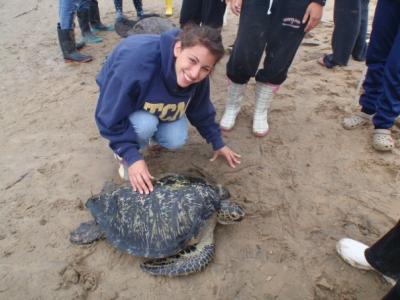School for Field Studies: Madeline Emde ’10
Madeline Emde ’10, a political science major with a minor in psychology and concentration in environmental studies, studied at a field station in Puerto San Carlos, Mexico through the School for Field Studies.


Madeline Emde ’10, a political science major with a minor in psychology and concentration in environmental studies, studied at a field station in Puerto San Carlos, Mexico through the School for Field Studies (SFS), where she learned about and experienced firsthand everything from sea turtle conservation to the economic conditions in Mexico.
“I was first attracted to SFS because of the experiential aspects of it, (where the) academics focused on environmental studies, which is my passion, (and where) I would actually be able to get out in the field and do work, if you can consider things like snorkeling and going whale watching work,” Emde said.
Initially, Emde had wanted to study in SFS’s Costa Rica program but did not have the prerequisites, so she chose the program in Mexico, called Conserving Marine Mammals and Coastal Ecosystems, which allowed her to discover some new passions.
“Mexico was next on my list, because I wanted to practice my Spanish and it had two of the same classes as the Costa Rica program. Little did I know how much I would love sea turtles and whales,” she said.
Through the three-month program, which was cut a few days short by the Swine Flu outbreak, Emde took three classes on coastal ecology, principles of resource management, and economic and ethical issues in sustainable development.
“They were all very interesting and interconnected so that things from one class could often be applied to other classes,” she said. “The academic portion of the program was very well balanced so that it dealt with the ecological, social, and political aspects of the environmental challenges studied.”
The fourth course was a directed research project where students worked with a professor in smaller groups and developed their own research paper. Emde looked at a survey about sea turtle conservation and wrote about communication methods that have been most effectively used in the sea turtle conservation movement for gaining public support through environmental volunteerism.
Emde said that, while the academics are an important part of the experience, even more important is what a student learns about herself and the place she visited. For example, she found herself greatly impacted by the poverty she saw among families in Mexico.
“I saw families of six or more living in houses the size of a ‘bedroom’ made from only cardboard boxes and scrap wood…. Children collected recycling from the streets to bring to the recycling center started by SFS so they could get a few pesos for food. These are the kind of things stick with you. They change the way you view things, and I think that that is one of the most important things you can gain from an abroad experience; a new perspective,” she said.
Emde said one of her favorite memories from the overall experience was the group’s first camping trip to monitor sea turtles, an experience she wrote about on her trip blog, http://maddiemexicotrip.blogspot.com. With only 16 students total in the Mexico program, Emde was able to become very close with all her classmates and teachers, solidifying SFS as an unforgettable experience.
“It was an absolutely amazing experience that I will never forget,” she said.
Posted on August 14, 2009

